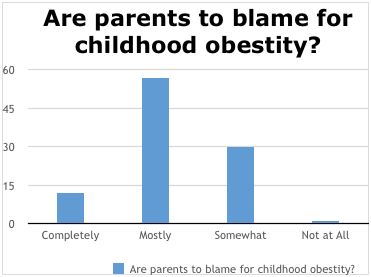Sermo Poll Explores the Causes of One of the World’s Biggest Health Challenges
Sermo, the leading global social network for physicians, announced today that 69 percent of doctors think parents are either completely or mostly to blame for the childhood obesity epidemic according to a recent poll of its members. The poll, which ran from Monday, August 17 – Wednesday, August 19, received 2,258 responses from doctors around the world. Thirty percent of respondents said parents are somewhat to blame and only 1 percent said they weren’t to blame at all.

According to the World Health Organization, childhood obesity is one of the most serious public health threats of the 21st century, putting children at serious risk for Type 2 diabetes, asthma and heart failure. The U.S. Centers for Disease Control and Prevention says one in six children in the United States is obese. In the UK and Canada, about one third of children are obese or overweight according to the NHS and Statistics Canada. Children who are obese are more likely to become obese adults; and obesity in adults is associated with a number of serious health conditions including heart disease, diabetes, metabolic syndrome and cancer.
Doctors are speaking out about their concern for these young patients with some tough love for their parents.
One doctor, an obstetrician/gynecologist said, “While it is likely true that in some instances excessive childhood weight is genetic, it’s hard not to think that in most cases the etiology is environmental. The most important component of that environment is parental control. Obesity is more a result of diet than exercise (as many have found, it is very difficult to “work off” excess consumption). Whether it is giving a young child a large bag of potato chips to keep him quiet in the store, or insisting she eat all her dinner, then give her dessert or multiple additional snacks, many parents have abandoned their responsibility to make the right decisions regarding their children’s health in exchange for expediency.”
A pediatrician added, “Clearly, parents need to shoulder some of the responsibility, and the blame. As parents, we have to set an example and to promote within our families healthy eating and healthy exercise. However, children are beset on all sides by their non-parental environment as well, which includes access to cheap, high-caloric foods; glitzy advertisements; a raft of screen and video entertainment; low-nutritional value school lunches; and on and on. Parents can be perfect role models, and still lose in this effort. But at least they stack the odds more favorably for their kids.”
Some physicians said that they think parents are not that much of a factor in childhood obesity.
An ophthalmologist said, “So we have now gone from fat-shaming saying the fat person is lazy to now blaming the parents of obese kids. Are they not knowledgeable? They don’t parent firmly enough? They won’t admit that their kid needs to lose weight? What is the excuse now? I won’t deny that there are some examples like this but I don’t think it is the majority.”
About Sermo
Sermo is the leading global social network for physicians – the virtual doctors’ lounge and the home of medical crowdsourcing – where doctors anonymously share their true feelings about their profession and lives and talk ‘real world’ medicine. Sermo has nearly 400,000 fully verified and licensed members and is now available for doctors in seven countries: the US, UK, Canada, Australia, South Africa, Ireland and New Zealand. Founded in 2005, Sermo’s mission is to unite physicians and provide them with a safe, private and trusted platform for free and open discussions. Sermo harnesses the collective wisdom of doctors, enabling medical crowdsourcing, knowledge sharing and thus the advancement of medicine.
What are Sermo polls?
Each Monday and Thursday, Sermo posts a poll with a fresh, topical question. Each poll can receive up to 3,000 votes. Polls are open to all members of the community. We ask anything from when was your last physical to how do you feel about maintenance of certification courses. Our polls are one of the most popular areas of our site; they spark plenty of healthy debate and enable doctors to have a voice on important issues. Members are not incentivized to participate in Sermo Polls. Sermo Polls are intended to be unscientific discussion starters to capture and report on the sentiment of thousands of physicians each week, on hot topics of the day.
Sermo Polls are written by the Sermo Community Team, reporters and by members, posted online within the closed Sermo community. Each member can vote a maximum of one time and polls are promoted both within the community and by email to community members. Only members of the Sermo community may vote. Members can see the results of the polls as votes are cast and final results are often posted in the Sermo blog.
Sermo members must go through a three-stage, highly secure and accurate verification process to ensure they are who they say they are. Because the sample is based on those who initially self-select for participation rather than being targeted from a probability sample, no estimates of sampling error can be calculated when projecting to the universe of physicians. However, the margin of error when projecting to active Sermo members is ±2% as all of these members were invited by email to participate in the poll. It is calculated at the standard 95% confidence level. Therefore we can be 95% confident that the sample result reflects the active Sermo member base within the margin of error. This calculator is based on a 50% result in a poll, which is where the margin of error is at its maximum. All sample surveys and polls may be subject to multiple sources of error, including, but not limited to sampling error, coverage error, and measurement error.
Media Contacts:
Randi Kahn, Public Relations Manager, Sermo
randi.kahn@sermo.com; +1.212.358.0800 x967
Osnat Benshoshan, SVP, Marketing & Strategy, Sermo
osnat.benshoshan@sermo.com;